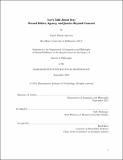| dc.contributor.advisor | Haslanger, Sally | |
| dc.contributor.author | Atherton, Emma Marija | |
| dc.date.accessioned | 2022-02-07T15:25:28Z | |
| dc.date.available | 2022-02-07T15:25:28Z | |
| dc.date.issued | 2021-09 | |
| dc.date.submitted | 2021-09-29T17:20:24.269Z | |
| dc.identifier.uri | https://hdl.handle.net/1721.1/140125 | |
| dc.description.abstract | This dissertation is about sexual pleasure and good, ethical sex. It is also about the ways women’s pleasure is routinely marginalized in (cis)heterosex, and the gendered and heteronormative social norms and scripts that lead to such routine marginalization. Through the lens of pleasure, this dissertation highlights dimensions of sexual ethics, sexual agency, and sexual (in)justice that are often overlooked in philosophical conversations dominated by the concept of consent.
Chapter 1 concerns the “pleasure gap”: the fact that in (cis)heterosex women report experiencing significantly less pleasure than men report (and significantly less pleasure than women having queer or non (cis)heterosex). I examine how the pleasure gap has been socially misunderstood and miscast as a “women’s problem” in ways which essentialize and pathologize women’s sexuality. I argue that pleasure gap is a social-structural problem, a phenomena arising out of the fact that the practice of (cis)heterosex is structured by social norms and expectations that reliably and routinely lead to the marginalization of women’s pleasure.
Chapter 2 examines how social scripts for (cis)heterosex shape women’s relationships to sexual pleasure. I suggest that the culturally dominant script for (cis)heterosex both constrains women’s sexual agency, and plays a role in producing women as particular kinds of sexual agents and subjects who relate to pleasure in (cis)heterosex primarily as something to perform and provide rather than pursue or experience. As such, we must understand the script as productive as well as repressive with respect to women’s sexuality in the context of (cis)heterosex.
Chapter 3 pivots to focus on good, robustly ethical sex. I introduce the reciprocal self-regulation model of sexual agency to describe how sexual partners co-determine the nature and content of their shared sexual experiences. I introduce this model as a means of thinking about what is actually involved in good, ethical sex and in sexual “flow”, and as an alternative to “ongoing enthusiastic” consent models which are increasingly and, I think, mistakenly cast as a new standard not only for permissible sex but also for sex that is robustly ethical and pleasurable. | |
| dc.publisher | Massachusetts Institute of Technology | |
| dc.rights | In Copyright - Educational Use Permitted | |
| dc.rights | Copyright MIT | |
| dc.rights.uri | http://rightsstatements.org/page/InC-EDU/1.0/ | |
| dc.title | Let’s Talk About Sex: Sexual Ethics, Agency, and Justice Beyond Consent | |
| dc.type | Thesis | |
| dc.description.degree | Ph.D. | |
| dc.contributor.department | Massachusetts Institute of Technology. Department of Linguistics and Philosophy | |
| mit.thesis.degree | Doctoral | |
| thesis.degree.name | Doctor of Philosophy | |
